Armenia’s constitution provides for a parliamentary republic with a unicameral legislature, the National Assembly (parliament). The prime minister, elected by parliament, heads the government; the president, also elected by parliament, largely performs a ceremonial role. Prime Minister Nikol Pashinyan’s Civil Contract party won 54 percent of the vote and an overwhelming majority of seats in parliament in snap elections held on June 20. According to the October 27 final assessment of the international election observation mission under the umbrella of the Organization for Security and Cooperation in Europe, voters were provided with a broad range of options, the elections were generally well managed, and contestants were able to campaign freely. The elections, however, were also characterized by intense polarization and marred by increasingly inflammatory rhetoric. The observation mission noted that “high levels of harsh, intolerant, inflammatory and discriminatory rhetoric in the period leading up to election day tainted the debate.” Other shortcomings included incidents of pressure to attend campaign events, allegations of vote buying, blurring of the line between the ruling party and state, alleged misuse of administrative resources, inadequate campaign finance provisions, and the narrow standing allowed for submitting electoral complaints.
The national police force is responsible for internal security, while the National Security Service is responsible for national security, intelligence activities, and border control. The Anticorruption Committee, established on October 23, replaced the Special Investigative Service as an independent agency specializing in preliminary investigation of cases involving alleged corruption by public officials. The Investigative Committee is responsible for conducting pretrial investigations into general civilian and military criminal cases and incorporates investigative services. The National Security Service and police chiefs report directly to the prime minister and are appointed by the president upon the prime minister’s recommendation. The cabinet appoints the head of the Investigative Committee upon the prime minister’s recommendation. The government appoints the head of the Anticorruption Committee based on a short-list produced by a special commission in charge of conducting a competitive selection process. Civilian authorities maintained effective control over the security forces. There were credible reports that members of the security forces committed some abuses.
A ceasefire in November 2020 halted 44 days of intensive fighting involving Armenia, Armenia-supported separatists, and Azerbaijan. Sporadic incidents of violence along the undelimited international border between the two countries and some other areas during the year resulted in casualties and detentions. There were credible reports that ethnic Armenian and Azerbaijani forces engaged in unlawful killings, torture, and other cruel, inhuman, or degrading treatment during, and in some cases after, the November 2020 fighting. Complaints submitted by Armenia and Azerbaijan to the European Court of Human Rights accusing each other of committing atrocities during the fighting in fall 2020 and summer 2016 awaited the court’s ruling. Since 1995 the final status of Nagorno-Karabakh has been the subject of international mediation by the cochairs of the Organization for Security and Cooperation in Europe’s Minsk Group (the United States, France, and Russia).
Significant human rights issues included credible reports of: torture by members of the security forces; harsh prison conditions; serious problems with judicial independence along with arbitrary or selective detentions; arbitrary or unlawful interference with privacy; serious abuses in conflict, including torture and other physical abuse; serious restrictions on free expression and media, including the criminalization of insults; trafficking in persons; crimes involving violence or threats of violence targeting civil society figures and lesbian, gay, bisexual, transgender, queer, or intersex persons; and the worst forms of child labor.
The government took only limited steps to investigate and punish alleged abuses by former and current government officials and law enforcement authorities. A trial into the culpability of former high-ranking government officials surrounding events that led to the deaths of eight civilians and two police officers during postelection protests in 2008 collapsed after the Constitutional Court invalidated the criminal code article underpinning the case. As of year’s end, parliament had not passed legislation establishing a fact-finding commission on human rights abuses. The government took steps to establish new mechanisms to investigate and punish corruption crimes.
https://www.state.gov/reports/2021-country-reports-on-human-rights-practices/armenia/

